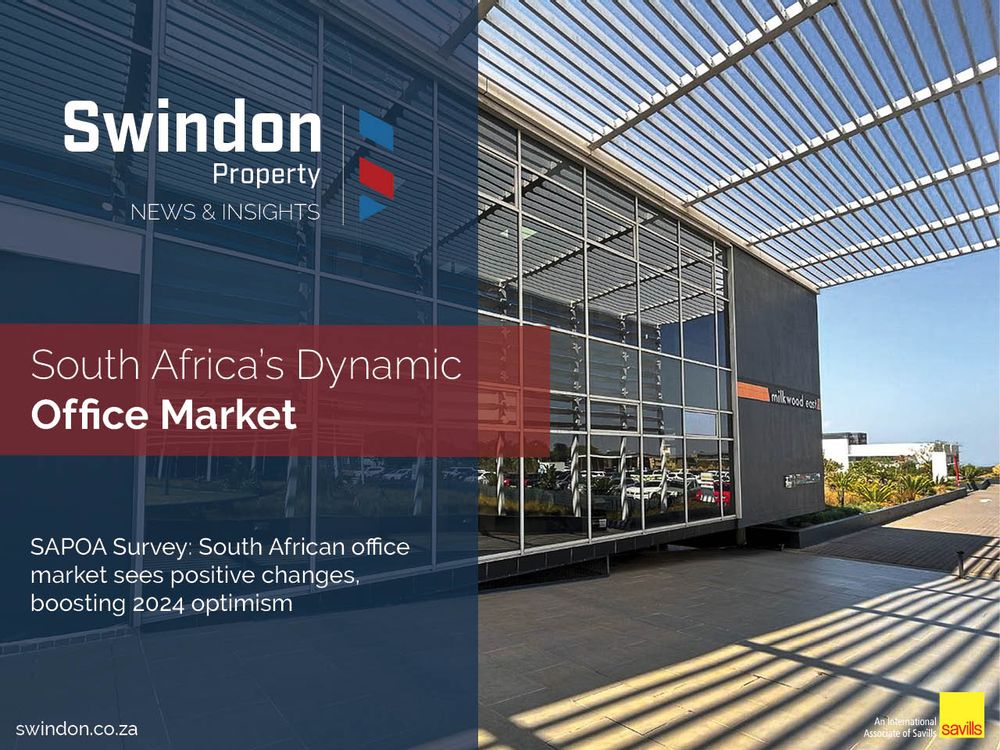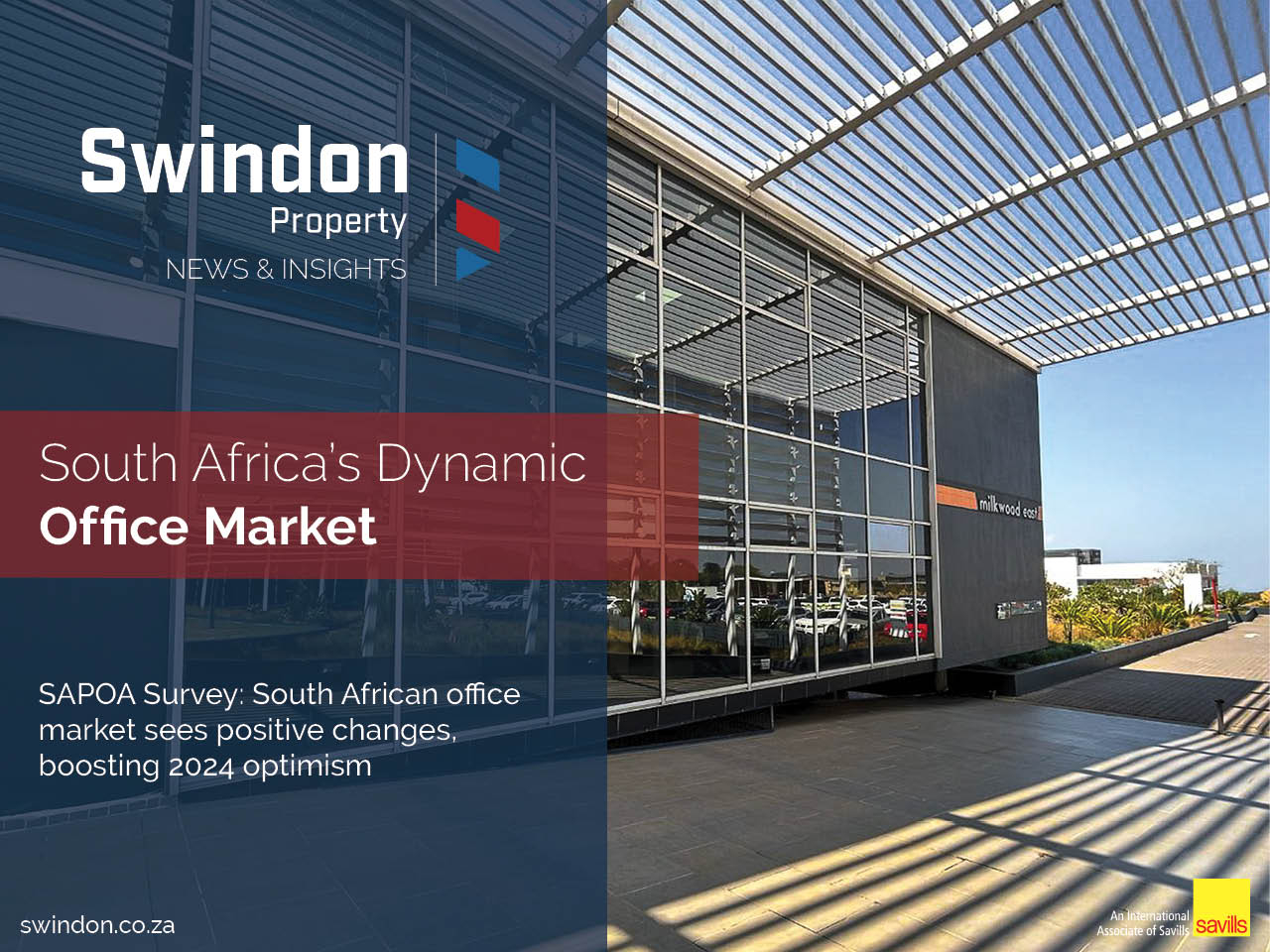Positive shifts in SA’s dynamic office property market
Demonstrating ongoing resilience and adaptability, positive shifts in the South African office property market as outlined in the recent SAPOA Office Vacancy Survey, underline the potential for optimism in 2024, including a reduction in vacancies across the country, says Andrew Dewey, MD of Swindon Property.
Reduced Vacancy Rates
According to the SAPOA’s survey, the overall vacancy rate in Q3 2023 improved by 30 basis points to 15.2%, which marks the sixth consecutive quarter of improvement since the peak in Q2 2022 at 16.7%.
In January and February 2024, Swindon Property concluded leases for 14 242 sqm of office space to a total value in excess of R115.6 million, despite the traditionally quieter holiday season which carries through from December to January.
Says Dewey: “Interestingly, the SAPOA survey highlights changing sectoral preferences, with technology and finance sectors showing resilience, and although challenges prevail for traditional industries, the steady improvement in occupancy rates signals a promising trajectory.
“Importantly, it should be borne in mind the regional nuances in office vacancy rates, notably in the City of Johannesburg, where the rate stands at 18.0%, the highest among the major metros. Conversely, the City of Cape Town's reduction to a 7.5% vacancy rate demonstrates the popular demand in the province fuelled by a variety of factors including solid infrastructure, proactive, solutions-driven governance, and an investment-friendly and aesthetically appealing environment. This is further fuelled by the fact that Cape Town is seen as one of the most desirable call centre locations globally, with an uptake of thousands of square metres of space by this sector - gathering extreme momentum post-Covid, and especially over the last three years. This has been a huge driver in the low vacancy rate.
“Slowing development activity has undoubtedly played a role in restoring market equilibrium. Looking ahead, we expect a gradual development rollout for 2024 as developers tread with caution to ensure pre-let development success and steer in line with tenant demand, despite economic growth challenges.
“Nothwithstanding persistent challenges including increased interest rates and loadshedding, this is a dynamic market influenced by a range of factors, including hybrid work models and changing occupier preferences. Positively, SA is also experiencing increasing international interest with a number of international companies opening shop, notably in Cape Town.”
Structural shift in spatial requirements?
As noted in a recent report by international real estate advisor, Savills, for whom Swindon Property is the commercial associate in sub-Sarahan Africa, the pandemic resulted in many questioning the long-term purpose of an office. Some market commentators rather hastily concluded that the majority of organisations would downsize, leading to a long-term reduction in office demand by as much as 50%.
The question of whether office demand has changed forever continues to be debated by developers, landlords, lenders and advisors. According to the Savills report, undoubtedly businesses are seeking to work more efficiently and reduce their footprint where possible, however, this too is highly nuanced and subject to overall workplace strategy, business sector and future growth. The picture will only become clear once a full cycle of lease expiries has concluded and pent-up demand from lockdown inertia has settled.
It’s no surprise that occupiers’ office requirements have evolved since the pandemic. With an ever-growing focus on the employee experience and an increased emphasis on balancing a quality office with efficient utilisation rates.
Globally, says Savills, the great work-from-home experiment has raised questions for occupiers in terms of understanding their future occupational requirements, how much space they require and how best to utilise it. In addition, there is the overarching challenge for some of how to encourage colleagues back to the office. More sophisticated occupiers have sought to increase productivity for many years through the design of their workplace. This is now a challenge for all occupiers, especially in an environment where some employees have the choice to attend an office or not. The response of businesses to this challenge has been mixed but it appears increasing numbers are mandating employees back to the office. In addition, and as a direct consequence of hybrid working, the design and use of office space and the needs of its occupants have evolved at an unrivalled pace.
Says Dewey: “While celebrating the overall decrease in the office vacancy rate from its 2022 peak, there remains a substantial quantum of available space nationally. This prompts consideration of alternative pricing models and flexible solutions such as revised leases and tenants relinquishing underutilised office space, to ensure that offerings remain competitive.
“While acknowledging positive shifts in the South African office market, adaptability and innovation are crucial, along with understanding tenant needs beyond physical spaces, balancing value, functionality, and viability through pricing strategies, and reimagining vacant spaces for optimal use.”
Milkwood Park, La Lucia, uMhlanga
Quest for premium office space
Concurring with Savills’ report, Dewey says that office occupiers today are increasingly discerning. “They recognise that high-quality offices can enhance productivity, employee retention and recruitment. Consequently, a general flight to premium space has been prevalent in many office markets, to which developers are responding by designing a wave of innovative and sustainable office buildings to satisfy the increasing expectations of almost all businesses. This continued evolution of best-in-class workspace, combined with an increased focus on sustainability, has resulted in an environment where the best gets better and the rest becomes mid-market or, at worst, obsolete.”
The evolution of Grade B
The Savills report goes on to say as the demand for best-in-class offices has increased, an over-supply of lower-quality stock in secondary locations represents a significant risk to landlords as occupiers relocate to better, more sustainable buildings in central, more convenient locations. Many occupiers, particularly in the current economic environment, will seek to balance trading up the quality ladder with value. Grade B demand will not disappear, but it will become more selective. Landlords will need to work harder to attract and retain this type of occupier – perhaps rethinking the usage of their buildings and investing in upgrades and renovations.
Sustainability to the fore
As noted by Savills, businesses across all sectors have, and continue to, recognise the need for their office buildings to play an important role in their own sustainability targets. Developers continue to push the boundaries in terms of sustainable development seeking to match their accreditations with their customers' aspirations. Awareness and understanding of specification, energy performance and decarbonisation is mixed within the occupier community. This however will become increasingly sophisticated with an emphasis on landlords being able to illustrate how their buildings can assist occupiers on their journey to Net Zero Carbon. The notion of a ‘green premium’ should ultimately erode as sustainability becomes a widely accepted characteristic of prime office space.
Lease flexibility is not a new phenomenon, nor is the world of flex space, however, the level of demand for both, however, is greater than ever before. Traditional leasing models are increasingly under pressure with occupiers seeking greater lease flexibility to allow them to scale up or down at more regular intervals. One may argue this acts as a convenient hedge against getting post-pandemic space take-up wrong, but the flight to quality is not only driven by specification and sustainability requirements but the ability to offer overall flexibility. At the smaller end of the market, the provision of turn-key, fully fitted space - not simply serviced space - is increasingly in demand. This is a result of the headaches of procuring and managing a fit-out and the associated costs. According to Savills, there is an anticipated increase in the levels of demand for flex space.
La Lucia Ridge: Swindon Property recently concluded a lease for A-Grade office space in Milkwood Park in La Lucia Ridge, uMhlanga.
For further information contact Swindon Property on +27 (21) 422 0778.



